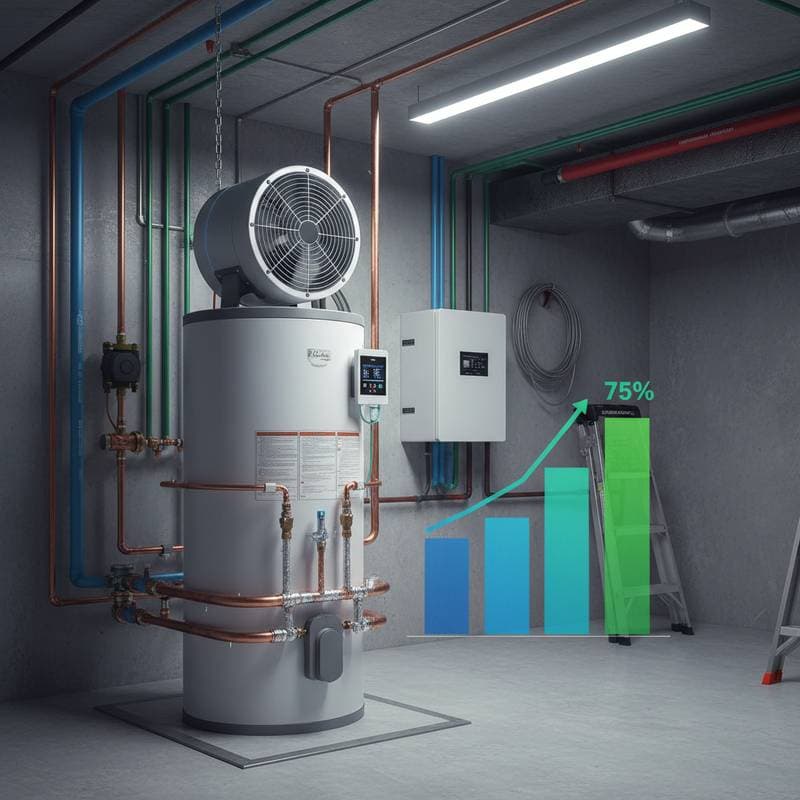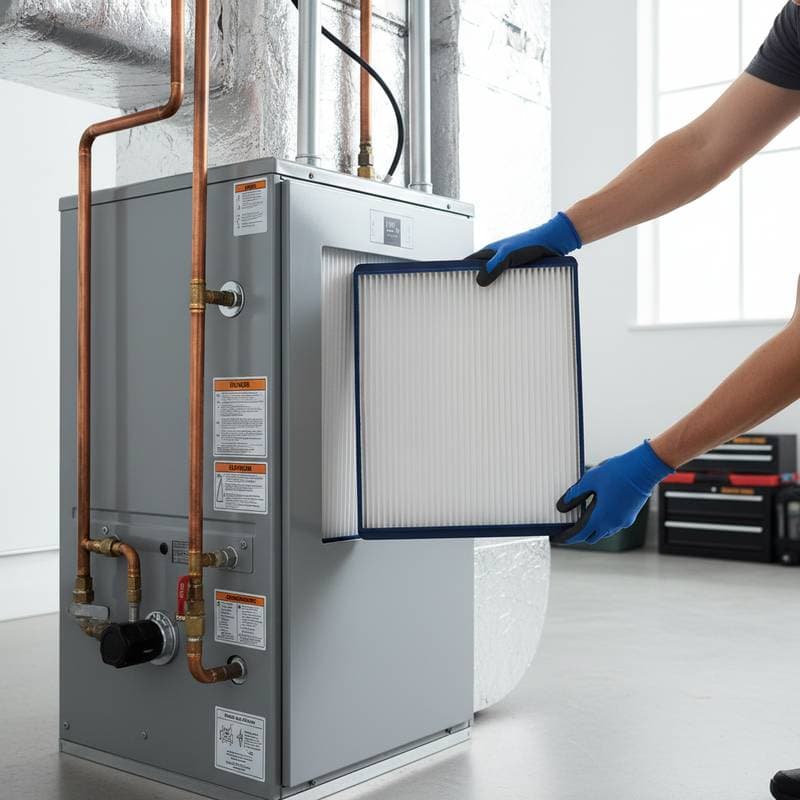How Heat Pump Water Heaters Deliver Four Times the Efficiency to Reduce Bills
The Mechanics of Savings in Water Heating
Heat pump water heaters revolutionize water heating for homeowners by achieving up to four times the energy efficiency of conventional electric units. These systems transfer heat from ambient air into the storage tank rather than producing heat through direct resistance. Homeowners often realize reductions in water heating expenses ranging from 50 to 75 percent, influenced by local climate conditions and daily hot water demands.
This guide details the operational principles behind heat pump water heaters, anticipated installation expenses, elements that determine overall savings, and strategies for selecting an appropriate unit for residential use.
Operational Principles of Heat Pump Water Heaters
A heat pump water heater functions in a manner akin to a refrigerator operating in reverse. It extracts heat from the surrounding environment and directs it into the water reservoir.
The system relies on four essential components to complete this cycle:
- Evaporator Coil: Captures thermal energy from the air.
- Compressor: Elevates the temperature of the captured heat.
- Condenser Coil: Releases the heat into the water within the tank.
- Expansion Valve: Controls the refrigerant circulation to sustain optimal performance.
Electricity powers the compressor and fan, but the majority of heating derives from extracted ambient heat. Consequently, each unit of electrical input yields up to four units of thermal output, minimizing energy consumption and operational costs.
Key Influences on Heat Pump Water Heater Performance
Multiple variables determine the efficiency and financial benefits of a heat pump water heater installation.
Ambient Temperature Considerations
Optimal operation occurs in environments maintaining temperatures between 40 and 90 degrees Fahrenheit. Suitable locations include garages, basements, or dedicated utility spaces where consistent warmth prevails.
Impact of Household Hot Water Demand
Families with higher hot water needs experience amplified efficiency gains. Regular usage patterns support steady system operation and accelerate the recovery of upfront investment through sustained savings.
Appropriate System Capacity
Available tank capacities span 40 to 80 gallons. Selecting a size matched to household requirements prevents excessive cycling and ensures reliable performance.
| Household Size | Recommended Tank Capacity |
|---|---|
| 1–2 individuals | 40–50 gallons |
| 3–4 individuals | 50–65 gallons |
| 5 or more | 65–80 gallons |
Importance of Professional Installation
Expert setup guarantees adequate airflow, proper drainage, and secure electrical integration. Substandard installation compromises efficiency and shortens equipment lifespan.
Availability of Financial Incentives
Numerous utilities and governmental initiatives provide rebates for energy-efficient heat pump models. These offsets, often amounting to several hundred dollars, shorten the time required to recoup initial expenditures.
Ensuring Durability Through Routine Maintenance
With consistent upkeep, heat pump water heaters endure 10 to 15 years of service. Schedule yearly inspections to clean air filters, inspect condensate lines, and flush sediment from the tank interior.
Frequently Asked Questions About Heat Pump Water Heaters
What Annual Savings Can Homeowners Expect?
Typical reductions range from $200 to $400 yearly, varying with regional electricity rates, consumption levels, and environmental factors. Cumulative savings over the unit's life often exceed the original purchase price.
Does the Unit Generate Noticeable Noise?
Operation produces a low hum comparable to that of a refrigerator. Placement in non-living areas, such as garages or utility rooms, renders the sound imperceptible in primary household spaces.
Can These Systems Function in Cooler Regions?
Performance remains viable in cold weather, though efficiency may decline in low-temperature settings. Advanced models incorporate hybrid configurations with auxiliary electric elements to sustain output during chilly periods.
What Is the Duration of a Typical Installation?
Skilled professionals complete most installations within 4 to 6 hours, contingent on existing infrastructure and any necessary modifications to plumbing or wiring.
Is Retrofitting Possible for Existing Water Heaters?
Replacement proves feasible in the majority of residences. Contractors assess ventilation needs and spatial constraints to propose suitable options; older structures might require basic electrical enhancements.
Securing Competitive Quotes for Heat Pump Installations
Essential Inquiries for Contractors
- Which brands and specific models suit my household scale and regional climate?
- What clearance and airflow provisions does the unit demand?
- Do local rebates or incentives apply to this purchase?
- What elements comprise the total installation fee?
- What coverage extends to labor and equipment under the warranty?
- Will you manage any required permitting processes?
- What ongoing maintenance options do you provide?
- What level of operational noise is anticipated?
- How accessible are spare parts for the recommended brand?
- Based on my current setup, what savings projections can you offer?
Maximizing Returns on a Heat Pump Water Heater
Installing a heat pump water heater stands as a premier strategy for diminishing energy demands and curbing water heating expenditures. By leveraging ambient heat transfer, these units surpass traditional systems in efficiency by a factor of four.
Homeowners pursuing cost reductions, ecological benefits, and enhanced reliability find this technology delivers enduring value. Through meticulous installation, periodic servicing, and optimization of influencing factors, expect dependable hot water supply alongside substantial utility bill decreases.





